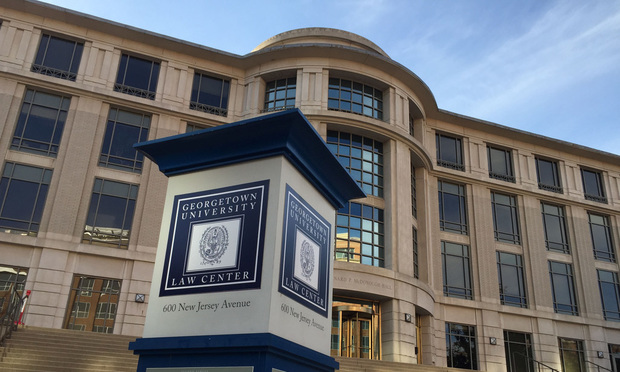GCs at Georgetown Hear Why It Pays to 'Meddle' With Outside Law Firms
Plus, D.C. hires by King & Spalding and Greenberg Traurig, and other business of law news from the nation's capital.
March 16, 2018 at 05:15 PM
6 minute read

Washington Wrap is a weekly look at the biggest legal industry news and Big Law moves shaping the legal business in Washington, D.C. Send tips and lateral moves to Ryan Lovelace at [email protected].
Among the topics at Georgetown Law's annual corporate counsel institute this week was one that has dogged the legal industry for decades: How can lawyers in positions of power make their colleagues prioritize diversity in the profession?
Joseph West, the Washington, D.C.-based chief diversity and inclusion officer at Philadelphia's Duane Morris, oversaw hundreds of millions of dollars of outside legal spending as associate general counsel at Wal-Mart Inc. from 2007 to 2011. There, he said, he learned that “you could meddle in [firms'] business” to advance reforms promoting diversity of ethnicity, gender and sexual orientation.
“I think one of the things that people don't talk about when they talk about the economic downturn, 2009 or so, is that corporate clients became more discerning consumers of legal services,” West said.
West, who joined Duane Morris in 2015, said that years ago he and then-Wal-Mart general counsel Tom Mars realized at an outside counsel conference that diversity reforms were necessary in part because of the “sea of white male faces” in attendance.
In response, West said, the company “essentially fired all of the relationship partners, required all of the firms to submit a list of five candidates, at least one had to be a woman, one had to be a person of color, and the incumbent could be submitted as well.”
West said that within 18 months of the shift about $60 million of business had changed hands to women and minority relationship partners.
“It's amazing how the loss of money clarifies the mind and encourages the spirit,” West said of the tools lawyers could use to push for diversity at big law firms.
Wal-Mart won accolades from the American Bar Association for being a corporate leader on diversity during Mars' tenure. Mars left Wal-Mart in 2013 and joined Atlanta-based Taylor English Duma a year later. He's now senior counsel at Friday Eldredge & Clark in Little Rock.
The speakers at Georgetown this week also had tips for attorneys hailing from outside Big Law. When an attorney for a smaller boutique questioned how his firm should address its shrinking diversity profile because of the exodus of a partner to a foreign market, PepsiCo in-house counsel Aida Babalola said it's important for firms to explain the reasons for such changes, rather than leave it to surveys to reflect the internal composition of their firms.
“What I don't want to happen though is for people of color or women to just be interchangeable pieces, to fill your quotas or your numbers or to make your survey look better,” Babalola said. “So that's why to me the story underneath is more important.”
Law firm moves, news and notes:
King & Spalding added intellectual property trial partner Lori Gordon as a partner in Washington. Gordon formerly co-chaired the patent trial and appeal board practice at Sterne, Kessler, Goldstein & Fox as a partner.
_______________________
Greenberg Traurig's Washington, D.C., offices grew with the addition of Lee Ann Anderson, who joined as a shareholder in the firm's corporate practice in D.C. and New York. Anderson previously served as a partner in Ashurst's Washington and New York offices after several years at Sullivan & Cromwell as special counsel.
Anderson counts Credit Suisse, JPMorgan, Deutsche Bank, Goldman Sachs, and Wells Fargo as former clients. Alan Annex, co-chairman of Greenberg Traurig's global corporate practice, said Anderson is joining the corporate practice at a “pivotal time” of development and expansion.
_______________________
Beveridge & Diamond formally welcomed John Cruden to its Washington office as principal this week, after he joined the firm near the start year. Cruden formerly served as the assistant U.S. attorney general for environment and natural resources before joining Beveridge & Diamond. In attendance for Cruden's formal welcome reception this week were Albert Beveridge, the Washington firm's surviving namesake, and Environmental Protection Agency counsel Matt Leopold, who was confirmed by the U.S. Senate in December 2017.
_______________________
Richard Westling, an Epstein Becker & Green litigation and health care partner, joined the legal team defending Paul Manafort, the former Trump campaign chairman in the crosshairs of Special Counsel Robert Mueller's investigation into Russian meddling in the 2016 U.S. elections.
Westling works from the firm's D.C. and Nashville offices, and brings experience as a federal prosecutor in New Orleans and from the tax division at Main Justice in the 1990s.
The first of two trials Manafort is set to face is scheduled for July 10.
_______________________
Barry Pollack, WikiLeaks founder Julian Assange's D.C.-based attorney, left Miller & Chevalier for a smaller law firm and told The National Law Journal he is representing a client in the Mueller probe whom he declined to identify. Pollack said he is only representing Assange in relation to an ongoing criminal investigation in Virginia and that Assange has not yet been contacted by Mueller.
Pollack's former Miller & Chevalier colleague, Kevin Downing, similarly left the firm last year in order to continue representing Manafort, who was charged a few months after Downing left Miller & Chevalier.
Assange said on Twitter that Pollack is a “decent man and an excellent trial lawyer.”
_______________________
The leader of an influential right-leaning think tank that advocates for lower taxes is planning to exit the institution next year, just as President Donald Trump's tax bill takes effect.
Arthur Brooks said this week he will quit the American Enterprise Institute in 2019 after 10 years as the influential think tank's president. In an op-ed for the Wall Street Journal, Brooks said he thought “social enterprises” such as AEI excel when the top leaders refuse to stay much longer than a decade.
“[W]hat worries me most today—not for AEI, but for America—is that the competition of ideas is under attack,” Brooks wrote. “I remain optimistic that think tanks, universities, and the media will continue to play a central role in American democracy.” (Sorry, law firms!)
_______________________
Late-night TV host Jimmy Kimmel used his platform at ABC to encourage viewers to help cover the legal fees of Stephanie Clifford, aka “Stormy Daniels,” who sued Trump last week after her silence was allegedly purchased before the 2016 election by Trump lawyer Michael Cohen.
Kimmel directed viewers on Thursday to a website for Daniels so that they “can give money to a porn star, just like the President of the United States.”
This content has been archived. It is available through our partners, LexisNexis® and Bloomberg Law.
To view this content, please continue to their sites.
Not a Lexis Subscriber?
Subscribe Now
Not a Bloomberg Law Subscriber?
Subscribe Now
NOT FOR REPRINT
© 2025 ALM Global, LLC, All Rights Reserved. Request academic re-use from www.copyright.com. All other uses, submit a request to [email protected]. For more information visit Asset & Logo Licensing.
You Might Like
View All
Pentagon Settles Suit Seeking to Clear Records of Service Members Discharged for Being LGBTQ
3 minute read
Female GCs Joining Corporate Boards in Large Numbers, Overcoming Biases and Stereotypes Along Way
9 minute read

Duane Morris Uses Nonequity Partnership as 'Income Shifting' Device, Class Action Contends
5 minute readTrending Stories
- 1Texas Supreme Court Grapples Over Fifth Circuit Question on State Usury Law
- 2Exploring the Opportunities and Risks for Generative AI and Corporate Databases: An Introduction
- 3Farella Elevates First Female Firmwide Managing Partners
- 4Family Court 2024 Roundup: Part I
- 5In-House Lawyers Are Focused on Employment and Cybersecurity Disputes, But Looking Out for Conflict Over AI
Who Got The Work
J. Brugh Lower of Gibbons has entered an appearance for industrial equipment supplier Devco Corporation in a pending trademark infringement lawsuit. The suit, accusing the defendant of selling knock-off Graco products, was filed Dec. 18 in New Jersey District Court by Rivkin Radler on behalf of Graco Inc. and Graco Minnesota. The case, assigned to U.S. District Judge Zahid N. Quraishi, is 3:24-cv-11294, Graco Inc. et al v. Devco Corporation.
Who Got The Work
Rebecca Maller-Stein and Kent A. Yalowitz of Arnold & Porter Kaye Scholer have entered their appearances for Hanaco Venture Capital and its executives, Lior Prosor and David Frankel, in a pending securities lawsuit. The action, filed on Dec. 24 in New York Southern District Court by Zell, Aron & Co. on behalf of Goldeneye Advisors, accuses the defendants of negligently and fraudulently managing the plaintiff's $1 million investment. The case, assigned to U.S. District Judge Vernon S. Broderick, is 1:24-cv-09918, Goldeneye Advisors, LLC v. Hanaco Venture Capital, Ltd. et al.
Who Got The Work
Attorneys from A&O Shearman has stepped in as defense counsel for Toronto-Dominion Bank and other defendants in a pending securities class action. The suit, filed Dec. 11 in New York Southern District Court by Bleichmar Fonti & Auld, accuses the defendants of concealing the bank's 'pervasive' deficiencies in regards to its compliance with the Bank Secrecy Act and the quality of its anti-money laundering controls. The case, assigned to U.S. District Judge Arun Subramanian, is 1:24-cv-09445, Gonzalez v. The Toronto-Dominion Bank et al.
Who Got The Work
Crown Castle International, a Pennsylvania company providing shared communications infrastructure, has turned to Luke D. Wolf of Gordon Rees Scully Mansukhani to fend off a pending breach-of-contract lawsuit. The court action, filed Nov. 25 in Michigan Eastern District Court by Hooper Hathaway PC on behalf of The Town Residences LLC, accuses Crown Castle of failing to transfer approximately $30,000 in utility payments from T-Mobile in breach of a roof-top lease and assignment agreement. The case, assigned to U.S. District Judge Susan K. Declercq, is 2:24-cv-13131, The Town Residences LLC v. T-Mobile US, Inc. et al.
Who Got The Work
Wilfred P. Coronato and Daniel M. Schwartz of McCarter & English have stepped in as defense counsel to Electrolux Home Products Inc. in a pending product liability lawsuit. The court action, filed Nov. 26 in New York Eastern District Court by Poulos Lopiccolo PC and Nagel Rice LLP on behalf of David Stern, alleges that the defendant's refrigerators’ drawers and shelving repeatedly break and fall apart within months after purchase. The case, assigned to U.S. District Judge Joan M. Azrack, is 2:24-cv-08204, Stern v. Electrolux Home Products, Inc.
Featured Firms
Law Offices of Gary Martin Hays & Associates, P.C.
(470) 294-1674
Law Offices of Mark E. Salomone
(857) 444-6468
Smith & Hassler
(713) 739-1250










